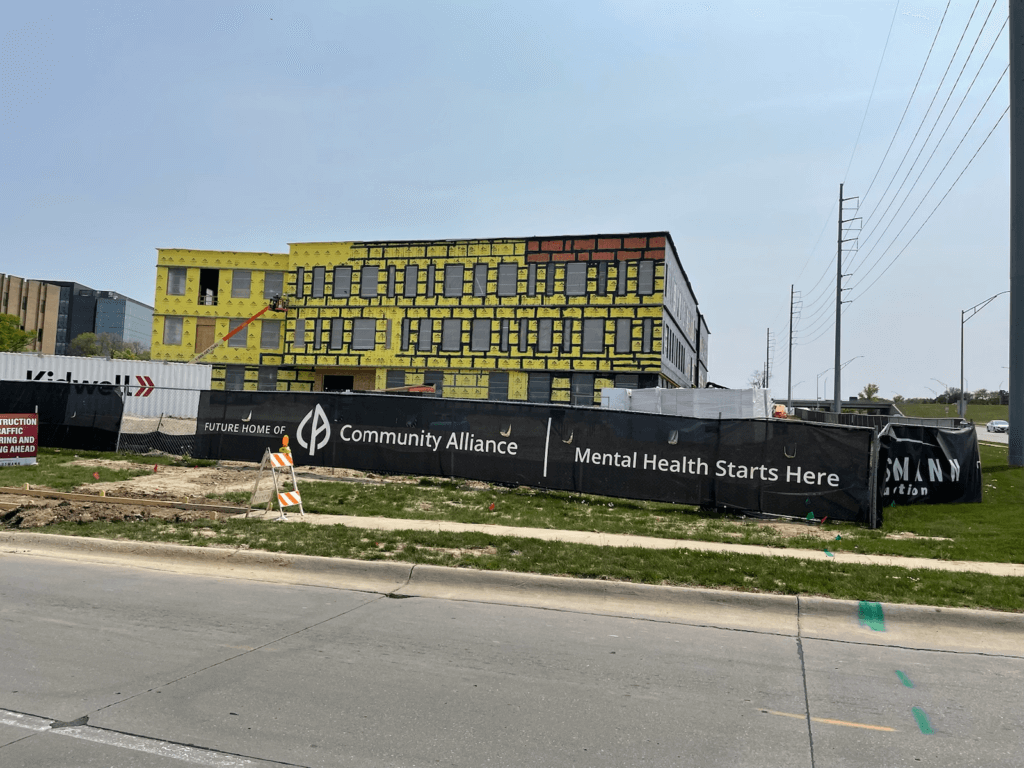
People experiencing a mental health crisis need help right away. More often than not, however, they must wait to get treatment because services are limited.
If you call most mental health facilities, Carole Boye said, you likely will have to wait three or four weeks for an appointment. And if you want to see a doctor, the wait could be six to eight weeks.
Boye, president and chief executive officer of Community Alliance mental health clinic in Omaha, said her organization aims to change that “so that we have the capacity that if they walk in or they call, they can see somebody today.”
The organization is building a 120,000-square-foot, three-story building at 72nd Street and Mercy Road in Omaha. The project, which will cost $65 million, is expected to be completed by spring 2024. Community Alliance received $10 million for the project from the State of Nebraska’s Building Mental Health Treatment Facilities Program, administered by the Nebraska Department of Economic Development (DED). The Nebraska Legislature appropriated a total of $40 million for the program, and then-Gov. Pete Ricketts signed the legislation in 2022. The money came from the Federal Coronavirus State Fiscal Recovery Fund, which was authorized by the American Rescue Plan Act.
Boye said the grant money was critically important for the Community Alliance project. “The public sector likes public-private partnerships,” she said. “The private sector loves public-private partnerships. So that really gave it legitimacy…The fact that the Legislature and the governor carved out dollars specifically for mental health was critical in terms of us as a state starting to try to fill a need.”
“Nebraskans seeking mental health care should have access right away, without delay,” said DED Interim Director Joe Fox. “The Nebraska Legislature saw the urgency of this need, and prioritized funding to strengthen our state’s mental healthcare capacity. Community Alliance is determined to eliminate the wait after Nebraskans reach out for care, and DED is proud to support their efforts.”
Before the COVID-19 pandemic, Boye said, an estimated 1 in 5 Nebraskans would face a mental health crisis in a given year. Post-COVID, she said, it’s 1 in 3. “Those kinds of statistics just show that mental health was a huge, huge impact during the pandemic,” Boye said.
Community Alliance, which primarily serves adults, now is based in a 47,500-square-foot building at 40th and Leavenworth Streets. It also provides services at a smaller facility and leases space near Lasting Hope Recovery Center at 415 S. 25th Ave. With the new building, Boye plans to increase Community Alliance’s number of employees from about 200 to 300. The building’s configuration, Boye said, will allow for “truly integrated care.”
“We think it’s a really nice idea for the primary care doc and the psychiatrists to actually talk to each other,” she said, “and so we want them on the same floor, interacting, and being on the same team.”
In addition to mental health services, Community Alliance helps people finish their education, get vocational training and find jobs and housing. The new building will allow the organization to expand its primary care offerings and set up a health and wellness center.
“When someone finally gets that strength and that courage to walk in the door, to make that phone call, we need to respond,” Boye said. “And that’s really the driver behind our growth plans.”
Boye said she was pleased to hear Governor Jim Pillen say that he wants to improve Nebraskans’ access to mental health care. Since taking office in January, Gov. Pillen has been a vocal champion of proposed legislation that would further expand mental healthcare capacity in Nebraska. Earlier this month, the Governor issued a proclamation designating May as “Mental Health Awareness Month” in Nebraska.
